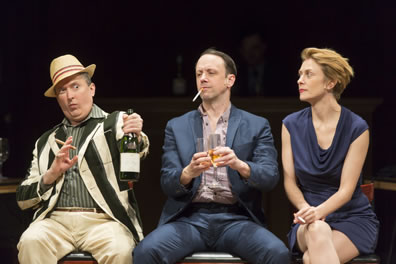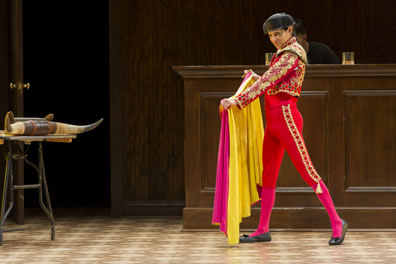The Select (The Sun Also Rises)
The Novelization of Great Theater
Text by Ernest Hemingway
Elevator Repair Service, Shakespeare Theatre Company, Lansburgh Theatre, Washington, D.C.
Monday, February 27, 2017, O–109&110 (center stalls)
Directed by John Collins

From left, Count Mippipopolous (Vin Knight), Jake Barnes (Mike Iveson), and Brett Ashley (Stephanie Hayes) enjoy "amazing champagne" in Elevator Repair Service's production of The Select (The Sun Also Rises) at the Shakespeare Theatre Company. Photo by Scott Suchman, Shakespeare Theatre Company.
In what looks like a spacious bar, with portraits of pugilists and bullfighters on the walls, wine bottles lining the shelves, and two four-chair-length tables in the middle of the room, a woman sits at one table drinking and a man seemingly tends the bar. Another man strolls in, the bartender joins him. Both sit, the bartender in the middle of the stage, the other man near the stage skirt. It's he who speaks. "Robert Cohn was once middleweight boxing champion of Princeton," he says, addressing the audience and pointing back to the man who had been behind the bar. "Do not think that I am very much impressed by that as a boxing title, but it meant a lot to Cohn."
These two sentences are the first in Ernest Hemingway's 1926 novel, The Sun Also Rises. We are about to hear and see the book exactly as Hemingway wrote it, though trimmed to fit into just over three hours' traffic on the stage (including a 15-minute intermission). The man speaking is Mike Iveson playing Jake Barnes, the novel's protagonist and narrator. In addition to descriptive prose, Jake inserts even the "I said," and "he said," attributions in the dialogue. At first—and in my description here—this might seem to be nothing more than storybook reading with actors providing the tale's visuals rather than pictures to show the assembled crowd.
However, The Select (The Sun Also Rises) is less about Hemingway than it is the Elevator Repair Service (ERS), the cutting-edge New York theater company staging this production in a month-long residence at the Shakespeare Theatre Company in Washington, D.C. The Select (The Sun Also Rises) premiered at Scotland's Edinburgh International Festival in 2010 as the third of ERS's literary trilogy (following Gatz, a 2006 staging of F. Scott Fitzgerald's The Great Gatsby, and the opening chapter of William Faulkner's The Sound and the Fury in 2008).
Founded 26 years ago, Elevator Repair Service blazed a path since followed by the likes of Fiasco and Bedlam. These companies use a meta-theater aesthete to expand the dimensions of stagecraft and audience-performance dynamics in order to blend the fictional reality of the play with factual realities of playmaking, creating a more comprehensive theatrical experience. By the end of The Select it's so much more than appreciating Hemingway's tale and lauding the actors' performances; it's also reveling in the empowerment the production gives you to charge your own imagination in the playing of the play.
The sound effects are a perfect example. This is Hemingway's semiautobiographical story of him and his fellow Lost Generation expatriates indulging in the hedonistic lifestyles of post–World War I Paris and Spain. There's a lot of boozing, much of it wine poured into glasses or straight from the bottle into mouths like fountains with mythological characters spouting arches of water into gaping dolphins. The wine seldom actually pours, however; but we hear it gurgling out of the bottle, and hear glasses clink in a toast even if the drinkers are on opposite sides of the room. When Barnes and Bill Gorton (Robert M. Johanson) are trout fishing on the Irati River, we can hear the fish plopping out of the water on one side of the theater or the other. Soon, we're actually seeing fish flying over the stage. Sound effects also create crowd noises, bar bands, bulls snorting and roaring, and taxis driving through the night.
The taxis themselves are chairs in the bar. While the sound effects technically create an immersive soundscape (Matt Tierney and Ben Williams are the sound designers, Jason Sebastian the sound engineer), the setting never moves from that bar scene (David Zinn is scenic and costume designer). It serves not only as various bars, cafes, and hotel lounges, it also provides Jake his office, apartment, and hotel rooms (the tables as desks or beds), it becomes the Pamplona town plaza and bullfight stadium (tables and seats become the grandstands), and it is the bank of the Irati River with the tables removed and the chairs providing stumps and rocks in our imaginations. Jake only catches a few small fish, he tells us, which we never see, but when Bill returns from his fishing place, his catch is represented by the two tables, which he carries in and places upside down on the floor, plus a small bench-like version of the tables: his smallest trout obviously is much bigger than anything Jake nabbed. A table with horns attached to one end serves as the opponent to bullfighter Pedro Romero (Susie Sokol), a bullfight we watch as Jake narrates at a microphone like a play-by-play sports announcer.
This is more than winking stagecraft or production budget sacrifices. For one thing, the demise of the bull is incredibly effective; I've never felt so sorry for a table in my life as I did watching that bull meet its end. Another bit of unusual—and what might seem unnecessary—stage business comes when the bar at the back of the stage is removed about halfway through the second act and we see that what ERS Artistic Director and The Select helmer John Collins (when he's not playing Cohn) and Johanson (when he's not playing Gorton or Zizi) have really been doing is not tending the bar but working the sound system (I suspect the other bar to the side of the stage is a second soundboard). This is like pulling the curtain to reveal the Wizard of Oz as a man manipulating special effects machinery; yet it doesn't undermine the illusion. Rather, it reinforces that Hemingway's stage is not a book but our own imagination; we play his characters, design his costumes and scenery, and choreograph the action in our minds based on his script. As the company honed this production over years of workshops and performances, "we wrestled with how to create an engaging live performance while navigating the tension between the communal experience of theater and the solitary intensity of reading great literature," Collins writes in his program notes.
Movement becomes another visual clue. ERS is known for its movement work, yet its choreography for The Select is generally simplistic. A fight scene is more powerful in the sound of punches landing than the punches' proximity to their targets. Dances rely mostly on booty-shaking and gestures you'd generally see at a sixth-grade mixer. Yet, the amateurish dancing represents the juvenile emotional states of these Lost Generation adults and their uninhibited imbibing in all things pleasurable, from French wines and food to bullfights and sex (or, in the case of Lady Brett Ashley played by Stephanie Hayes, all of that in a single formula providing her the equivalent of a crack cocaine hit). The production has one of its most effective moments early in the play when Jake and Brett end up with Count Mippipopolous (Vin Knight) who serves them champagne that is so good it inspires Brett to propose a toast "to royalty." The count cuts her off. "This wine is too good for toast-drinking, my dear," he says. "You don't want to mix emotions up with a wine like that. You lose the taste." Jake tells us right off that "It was amazing champagne," but the sound of champagne pouring, the actors' exaggerated movements, and their wonder-in-the-eyes presentation combine to give the audience full appreciation of just how amazing that wine is.

Pedro Romero (Susie Sokol) is the young matador in Ernest Hemingway's account of a Pamplona bullfight in his novel The Sun Also Rises, presented in theatrical form in Elevator Repair Service's The Select (The Sun Also Rises) at the Shakespeare Theatre Company. Photo by Scott Suchman, Shakespeare Theatre Company..
Brett and her new mate Mike Campbell (Paul Boocock) seem a horrible mismatch as couples go. He is the most obnoxious of drunkards with his shallow testosteronic nature; she displays good manners and culture, a quiet strength but a fragile psyche; both constantly bicker with each other with sincere loathing. However, twice they enter a scene and in perfect synchronization hop up to their bar-stool seats with gleeful expressions, a silly-seeming gesture perhaps but one that illustrates how they pair up in their quest for joy de vivre.
The 1920s setting is allegorically transferred 90 years forward through modern costuming, the dance styles, and manners of speaking. For the men, Zinn's costumes of suits and casual work wear might be ubiquitous—they could be European now, they could be then. But neither Cohn's companion, Frances (Kate Scelsa), nor Brett look like flappers. Brett, in fact, exudes a chic look in her draping blue miniskirt, creating an affiliation of long legs and graceful bearing that proves a powerful aphrodisiac for every man who meets her. The dialogue is delivered with casual hipness, and Scelsa earns applause when her Frances goes off on a melt-down tangent; it might not sound like what we think of as Hemingway, but it's straight from the book, five full paragraphs of stream-of-conscious shrill. Even the unveiling of the computerized sound equipment reminds us that what we are watching is happening here and now.
Through these means we become both consciously and subconsciously invested in these characters. It would be easy to dismiss these pampered playboys and playgirls and their bohemian lifestyles, but in the performances of this ensemble these characters emerge as truly tragic figures for whom we can feel empathy—even, for a bit, Boocock's obnoxious Campbell. We see the two speeding trains of Cohn's unraveling emotional bearings and Brett's ever-addictive behavior on parallel tracks heading for an inevitable juncture, but we ride anyway hoping that Jake, Brett, and Cohn, at least (hard to get on board with Campbell), come out unscathed. But scars are of no consequence to Jake, who lives an impotent life due to a war injury, and for Brett, who uses her emotional injuries to fuel her next sexual adventure. Cohn, a Jew enduring a lifetime of prejudice who can never separate emotion from pleasure, eventually will have no choice but to give up pursuing his fellows' hedonistic ways.
The entire ensemble, by the way, is strong through and through, but special notice must go to Iveson for the breadth of his Jake Barnes serving as both narrator and unfulfilled lover, and Hayes, whose Brett balances strength of resolve so delicately with her emotional frailty.
You might walk into the theater expecting a play; you might, from the program notes, be anticipating a reading of select The Sun Also Rises excerpts. Based on the reputation of Elevator Repair Service, whom I'd never seen before now, I wasn't sure what to expect except that it would be fascinating, at least. I now can tell you the satisfaction I feel when all is done and said. For never before have I come to the end of a play feeling that I'd just read a great novel.
Eric Minton
March 1, 2017
Comment: e-mail editorial@shakespeareances.com
Start a discussion in the Bardroom



 Find additional Shakespeareances
Find additional Shakespeareances